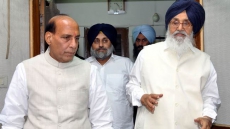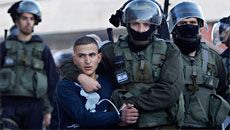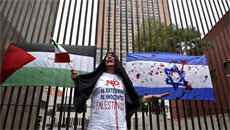JERUSALEM - Gaza militants renewed rocket fire on Israel after a three-day truce expired on Friday and negotiations in Cairo on a new border deal for the coastal strip hit a deadlock.
The Israeli military said at least 10 rockets were fired at Israel after the temporary truce expired at 8 a.m. (0500 GMT).
Earlier, a senior Hamas official said the militant group would not extend the cease-fire. He said Israel had rejected all of Hamas' demands in Egyptian-brokered talks, including a guarantee in principle that Gaza's borders would be opened. The official spoke on condition of anonymity because he had not yet delivered Hamas' response to Egyptian officials.
The talks in Cairo followed a month of bitter Israel-Hamas fighting.
Israeli strikes on Gaza killed nearly 1,900 Palestinians, wounded more than 9,000, devastated large areas along Gaza's border with Israel and displaced tens of thousands of people. Sixty-seven people, all but three of them soldiers, were killed on the Israeli side, and Gaza militants fired thousands of rockets at Israel over the past month.
It was not clear if Friday's renewed rocket fire and tough messages from Hamas were negotiating tactics or the beginning of a return to fighting.
According to one Palestinian media report, Egypt had proposed that even without a formal extension of the truce, the two sides would hold their fire in coming days to allow for a continuation of the negotiations.
The expiration of the temporary truce was preceded by all-night meetings between Egyptian mediators and the Palestinian delegation in Cairo.
The Israeli delegation left Cairo on Friday morning, according to a Cairo airport official who spoke on condition of anonymity because he was not authorized to speak to the media.
The Cairo talks focused on new border arrangements for Gaza, including the lifting of a blockade by Israel and Egypt and reconstruction of the battered territory. Israel and Egypt had enforced the blockade to varying degrees since Hamas seized Gaza by force in 2007.
Israel has said it is willing to consider easing the border restrictions, but demands that Hamas disarm, a condition the Islamic militant group has rejected.
Hamas has said it is willing to hand over some power in Gaza to enable its long-time rival, Western-backed Palestinian President Mahmoud Abbas, to lead Gaza reconstruction efforts, but that it would not give up its arsenal and control over thousands of armed men.
Israel argues that it needs to keep Gaza's borders as long as Hamas tries to smuggle weapons into Gaza.
The closure has led to widespread hardship in the Mediterranean seaside territory. Movement in and out of Gaza is limited, and the economy has ground to a standstill and unemployment is over 50 per cent.
The Gaza war grew out of the killing of three Israeli teens in the West Bank in June. Israel blamed the killings on Hamas and launched a massive arrest campaign, rounding up hundreds of the group's members in the West Bank, as Hamas and other militants unleashed rocket fire from Gaza.
On July 8, Israel launched an air campaign on the coastal territory, and nine days later, sent in ground troops to target rocket launchers and cross-border tunnels built by Hamas for attacks inside Israel.
Shortly before the truce expired Friday, Israel's international airport halted all incoming and outgoing flights for 20 minutes, apparently as a precautionary measure. Airports authority spokeswoman Liza Dvir said no flights were kept waiting in the air and that operations later resumed as normal. There was no further comment on the measure. Last month, the Federal Aviation Authority cancelled U.S. airline carriers' flights to Israel for about two days because a rocket had landed near the Tel Aviv airport.




